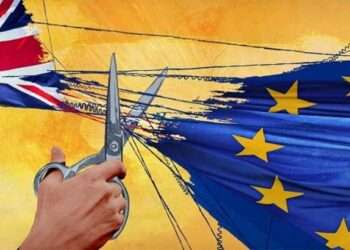Britain’s divorce from the European Union has been thrown into a fresh crisis after London threatened to undermine the exit agreement unless free trade terms are agreed by next month.
In yet another twist to the four-year saga since Britain voted narrowly to quit the bloc, Prime Minister Boris Johnson’s government was reportedly planning new legislation to override parts of the Brexit Withdrawal Agreement signed in January.
This legislation could potentially jeopardize the whole treaty and create frictions in British-ruled Northern Ireland where special arrangements had been made to avoid a hard border with Ireland to the south that could be detrimental to a peace agreement.
Sections of the proposed internal market bill are expected to “eliminate the legal force of parts of the withdrawal agreement” in areas including state aid and Northern Ireland customs, the Financial Times newspaper said, citing three people familiar with the plans.
EU diplomats were stunned, cautioning that such a step on the eve of new talks in London would tarnish Britain’s global prestige and heighten chances of a tumultuous final separation from the bloc.
The report was however neither confirmed nor denied by Britain. A government spokeswoman said it would work to resolve outstanding disagreements about Northern Ireland with the EU but was considering fall back options.
“We will always reserve the right to act in the best interests of Northern Ireland and the UK’s internal market.
“Our top priority is to preserve the huge gains from the peace process and the Belfast (Good Friday) Agreement, as well as protecting Northern Ireland’s place in our United Kingdom,” she said.

Britain left the EU on January 31, 2020 but talks on a new trade deal before the end of a status-quo transition arrangement in December have hit a snag on state aid rules and fishing. London has also set a deadline of Oct. 15 to strike a deal.
European diplomats said Britain was playing a game of Brexit chicken by threatening to collapse the process and challenging Brussels to blink first. Some fear Johnson may view a no-deal exit as useful distraction from the coronavirus crisis.
Without a deal, about $900 million annual trade between Britain and the EU could be thrown into uncertainty, including rules on everything from car parts and medicines to fruit and data.
Some Brexit-supporting members of the ruling Conservatives oppose the withdrawal agreement as threatening British independence even if the two sides secure future trade ties.
There was surprise and anger on both sides of the Irish border and in Brussels at the reported plan to undermine the withdrawal pact.
“If the UK chose not to respect its international obligations, it would undermine its international standing,” said one EU diplomat. “Who would want to agree trade deals with a country that doesn’t implement international treaties? It would be a desperate and ultimately self-defeating strategy.”
EU chief negotiator Michel Barnier, acknowledged anxiety that remains as a result of the unresolved terms.
“I remain worried …The negotiations are difficult, because the British want the best of both worlds,” Barnier said.





















